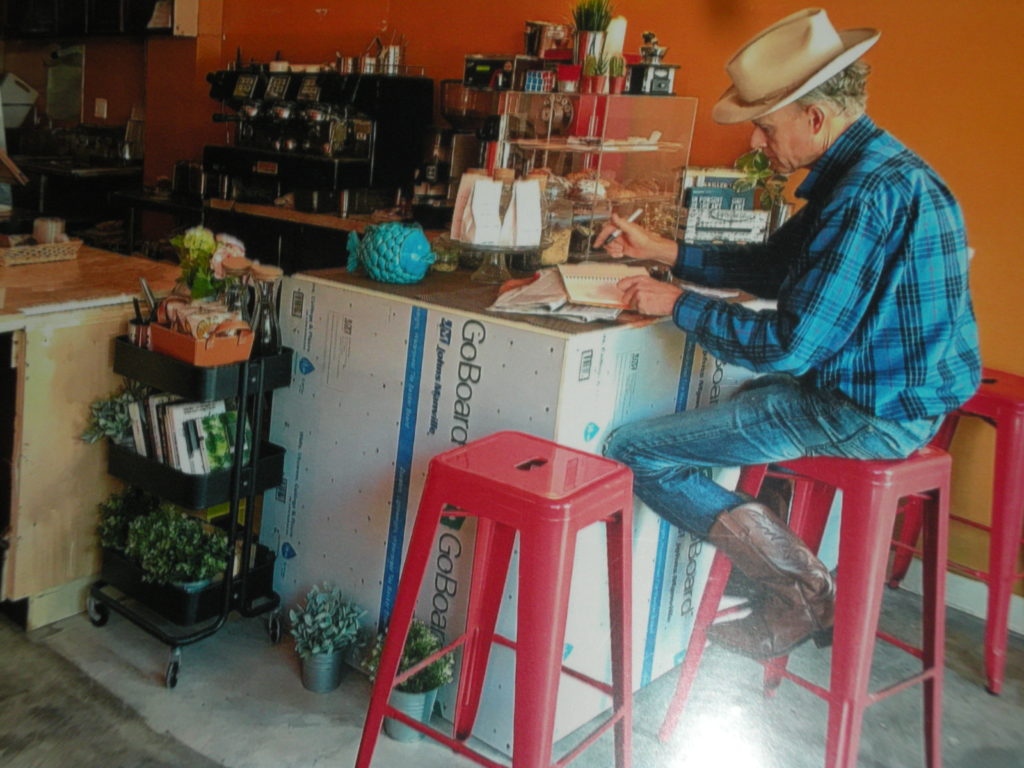HOLLYWOOD—On a Friday in the spring 2016, after being away for several days, I encountered a group gathered around the bar, glummer than usual. “Did you hear the news?” motorcycle John asked. And I knew. I’d been laying odds for a long time. Would the couple who’d bought the cafe five years earlier stick to their plan of going back to Turkey? It is easy to get caught up in the hurdy-gurdy of the U.S.A. Pretty soon 15 years go by, the kids are all grown up. But I’d had a premonition earlier in the year: this sweet set-up at Cafe Om couldn’t go on forever, though I wish it had. One of us was going to make a move, one way or the other.
No question Tolga and Nesrin were making the right move. Tolga was putting in 14-hour days, and he was at times coming to the edge of sanity and sleep deprivation. In addition to the cafe’s hours open, there were hours of shuttling across the city and buying supplies. This was taking a toll. Not to say that it wasn’t a tough decision, I know it was. A tribute to Tolga’s character was that he never diminished his clients’ pleasure by making the cafe’s change of ownership and their future a topic of conversation.
“Why didn’t you tell us?” motorcycle John said.
“I am not the bearer of bad news,” Tolga said. Nesrin spilled the beans.
Their plan was fulfilled: to take their child back to their world and culture before it was too late. Next year he would be five.
It was a leisurely move, with plenty of time to remember the good times and also to mourn and accept.
They decided to pass on the karma, and found the right person to pass it on to. A few months earlier Ai had come into the cafe as a customer, and felt its local vibe and sensed it could grow in new ways. And the new owner changed little things, like now people paid immediately after ordering, regardless of whether it was to-go or stay. Live flowers appeared—that was a bit of unexpected freshness and beauty. One regular stopped coming in for his mocha lattes after real chocolate substituted powdered chocolate. Then a full remodeling took place. The drab cabinets were ousted and replaced by shelves; space opened up. I was forced to face overwhelming change—this great universal phenomenon—on a trivial scale, admittedly, but no less painful. I faced the sheer folly and yet the truth of being sore about the changes. Like the Prince says in the Leopard, “Things must change to stay the same.”
The remodeling took place in stages and in a spirit of trying to maintain the best of Om on its way to becoming If. That spirit was embodied in a repurposing of a carved strip of the famous divan. It now rests under the glass top of the bar, now relocated to the window. A new espresso maker came to replace the old one that was on its last leg, its life extended by frequent repairs.
I got to face the absurdity of wishing the new person to be the old person. But the new person was who there was and had new gifts to offer. The walls were now the whitest expanse of white, and the obesity of time—a rich attribute of the old Om—was trimmed a bit. When I go there now I feel like I’m in Stockholm, which is a nice feeling. I experience the richness of space, and those guys in Stockholm have a great health care system.
With Om’s evolution into if a small group of people is bound together by a seismic nostalgia. And yet every day should be the first day; don’t look back, I say. The keenly felt pang for the passing of a few things and the disappearance of people is precisely the bittersweet bonus of sticking around a continually changing place like Los Angeles long enough, knowing damn well the city was a sight uglier and nastier when I first came one Hades-hot August many moons ago. I found the heat alluring, and would have put up with it every day of the year. Even the downtown floating in napalm-orange smog had a bizarre allure. Yet from the get-go I accepted Los Angeles as is, because of the powerful dreams that brought me here.
Grady Miller is a humorist. This concludes his chronicle on the evolution of a West Hollywood institution.






